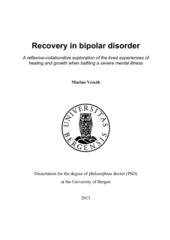Recovery in bipolar disorder. A reflexive-collaborative exploration of the lived experiences of healing and growth when battling a severe mental illness
Doctoral thesis
Permanent lenke
https://hdl.handle.net/1956/8767Utgivelsesdato
2013-01-23Metadata
Vis full innførselSamlinger
Sammendrag
The aim of this thesis is to explore processes of recovery in bipolar disorder. What do people with bipolar disorders do to promote healing and growth in their lives, and what challenges do they meet over the course of their recovery? How do professionals view their patients’ struggles and efforts when facing a bipolar disorder, and what role do they see the individuals themselves as having in processes of improvement and positive change? We conducted two qualitative studies to approach this aim. In the first study we performed semi-structured individual interviews with people who have battled a bipolar disorder and in the second study with experienced therapists who have engaged with people in this struggle. These investigations were developed and conducted within a reflexive-collaborative framework where a group of people with first-hand knowledge of the phenomena of focus participated as coresearchers. We cooperated in the process of designing the present research project, making preparations for the data collection and analyzing the transcribed interviews. A hermeneutical-phenomenological approach was utilized in our efforts to understand the participants’ experiences of healing and growth when facing a bipolar disorder. From this perspective, the phenomenological goal of exploring participants' lived experiences is seen as requiring a hermeneutical process of interpretation and reconstruction of meaning. The understandings generated in the present research project will therefore require the fusion of the experiential horizons of researchers, coresearchers and participants. The findings of this thesis are presented in three articles. The first paper explores how participants in the first study experience their own efforts toward improvement and positive change in an everyday life confronted with a bipolar disorder: what do individuals with bipolar disorders do to promote their personal recovery, and what challenges do they meet? The second paper examines these participants’ accounts of what it is like discovering that one is struggling with a bipolar disorder: what does it mean for a person to find out that their symptoms and distress match the description of what is commonly seen as a severe mental illness? The third paper presents results from the second study focusing on how these participants view processes of recovery in bipolar disorder as well as the person’s own initiatives to heal and grow: how do psychiatrists and clinical psychologists view their patients’ struggles and efforts when facing a bipolar disorder? In the articles we present our findings as themes that summarize important aspects of the participants’ descriptions. In the first paper, four themes are drawn from our analysis of the participants' efforts to improve and recover: (1) handling ambivalence about letting go of manic states; (2) finding something to hang on to when the world is spinning round; (3) becoming aware of signals from self and others; and (4) finding ways of caring for oneself. In the second paper, we describe first-person perspectives on the process of finding out that one is struggling with a bipolar disorder through three phases: (1) uncertainty and confusion; (2) grasping the novel and unusual experiential states; and (3) giving meaning to the lived experiences of intense ups and downs. In the third paper, three themes summarize the participants’ narratives of their patients’ struggles and efforts when facing a bipolar disorder: (1) a puzzling given; (2) the protagonist of the recovery process; and (3) the heroic fighter does not always win. The findings in each of the articles are discussed in relation to established theory, research and practice. The limitations and strengths of the studies are explored, as well as our experiences of conducting the research. As the present research project is based on a novel and innovative approach to generating knowledge in the field of mental health, this thesis not only aims to explore recovery processes, but also to discuss and make the reflexive-collaborative methodology that we have utilized available to the scientific community.
Består av
Paper 1: Veseth, M., Binder, P. E., Borg, M., & Davidson, L. (2012). Toward caring for oneself in a life of intense ups and downs: A reflexivecollaborative exploration of recovery in bipolar disorder. Qualitative Health Research, 22, 119-133. The article is not available in BORA due to publisher restrictions. The published version is available at: http://dx.doi.org/10.1177/1049732311411487Paper 2: Veseth, M., Binder, P. E., Borg, M., & Davidson, L. (2013). How I found out I had a bipolar disorder: A reflexive-collaborative exploration of the process of identifying that one is struggling with a severe mental health problem. Qualitative Studies, 4(1), 21-38. The article is available at: http://hdl.handle.net/1956/8766
Paper 3: Veseth, M., Binder, P. E., Borg, M., & Davidson, L. Experienced therapists’ view of their patients’ struggles and efforts when facing a bipolar disorder. The article is not available in BORA.
